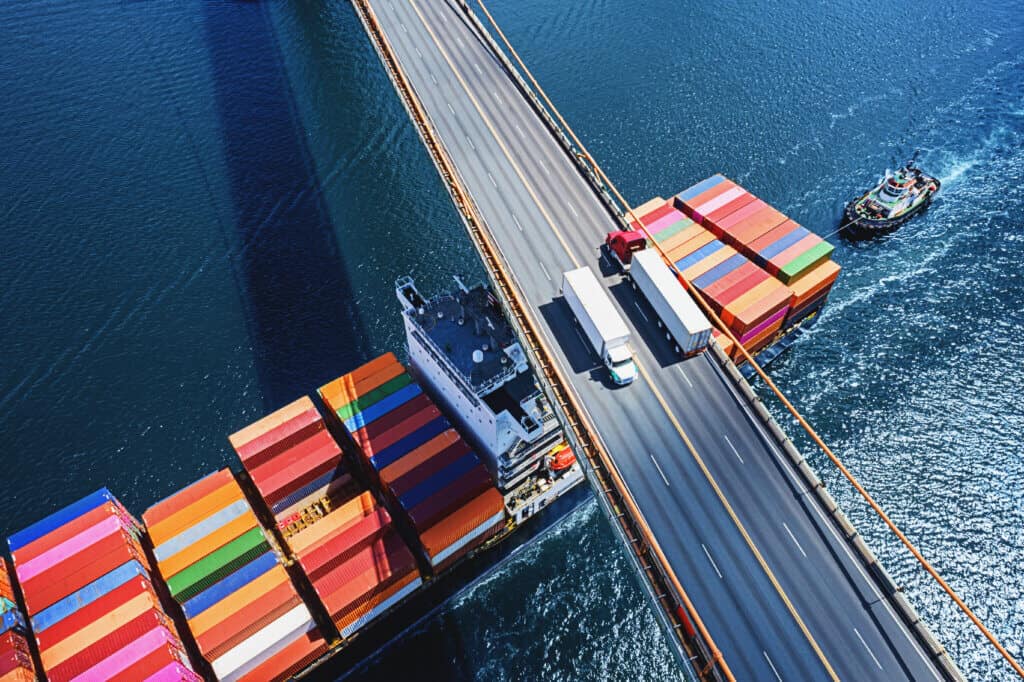
If you were to stand on the load platform at the massive Domino Sugars refinery along the Port of Baltimore today, you would see the collapsed remnants of the Francis Scott Key bridge in the distance. The bridge was a vital piece of the city’s infrastructure and a notable part of its visual identity. In addition to the unfortunate loss of life, there was also a tremendous loss of property, and the rebuilding process could take years and cost hundreds of millions of dollars.
Baltimore is the ninth busiest port in the U.S. in terms of total dollar value and tonnage, so the effects of the Baltimore bridge collapse will reverberate far and wide. Debris is now dangerously clogging the port, making it unsafe for the hundreds of large container ships that patronize it annually for import and export purposes. This busy port also includes major railheads and truck depots, so the entire ecosystem of logistics operations in the port has been affected.
Much has already been said about the magnitude of disruption that will reverberate through the local economy and global supply chains, but what about the average person? How will this catastrophe impact their lives? To get an idea, we must consider the three primary industries affected.
The import and export of sugar will be affected
The Port of Baltimore plays a significant role in the import of agricultural products. Sugar is by far the largest bulk import, with more than 575,000 metric tons of sugar having been unloaded in Baltimore in 2022. In all, around six million pounds (or just under three million kg) of sugar are processed daily. Raw sugar arrives by rail and leaves Baltimore in ocean containers bound for international markets once refined.
The owners of the Domino refinery seem confident that the closure of the port will not immediately impact short-term operations, thanks in large part to months-long sugar reserves the company has on hand. However, the timeline for the re-opening of the port is ambiguous, so the prognosis is likely to change over time. The effects may not be felt immediately, but down the road, the U.S. sugar market may experience shortages and/or increased prices as well.
We’ve previously discussed how the sugar industry can be affected by outside variables. The cost of sugar already increased in February, but when you consider how many basic products and businesses rely on this basic commodity, prices will escalate as demand drives higher.
Expect delays for the auto industry in the Midwest and East Coast
According to data from the Maryland Port Administration, Baltimore is the #1 port in the nation for car imports. In 2023, over 847,000 vehicles were handled by the port’s state-of-the-art infrastructure, which was specifically designed to offload automobiles in bulk. Additionally, the port is geographically closer to the Midwest than any other port on the eastern seaboard, providing the shortest distance between manufacturer and market.
Baltimore handles more roll-on/roll-off (Ro/Ro) cargo than any other U.S. port, including automobiles, light trucks, farm equipment, and construction machinery. Ro/Ro cargo enables importers to drive vehicles on and off cargo ships with no need for cranes. While efficient, Ro/Ro cargo also requires specialized ports to accommodate the enormous ramps and parking lot space required to offload and store vehicles. The bridge collapse has, of course, brought all Ro/Ro operations to a halt.
For the general public, the ensuing impact on the auto market will probably rekindle memories of the shortages and delays experienced during the Covid-19 pandemic. In this case, ships must route through specialized ports that can accommodate Ro/Ro cargo. The nearest ports that most closely align with these requirements are located either in or near Savannah, Georgia; Newark, New Jersey; and Jacksonville, Florida. Additionally, there will be more downstream work clearing customs and finding auto haulers to deliver the vehicles to their final destination.
Baltimore’s coal export industry is on hold
Thus far, in 2024, Baltimore has ranked as the second largest coal exporter in the U.S. Since the beginning of the calendar year, the city has exported over 20 million short tons of steam and metallurgical coal. Two coal export facilities are located at or near the Port of Baltimore: the Curtis Bay Piers coal terminal, operated by CSX and located near the highway, which ran over the Francis Scott Key bridge; and the Baltimore Marine terminal, operated by Consol Energy.
Despite the waning popularity of coal in the U.S., it is still used for energy generation in many other nations. It is a part of practical everyday life for some people. Both the Curtis Bay and Baltimore Marine plants are major coal suppliers for India, so unfortunately, the closure may burden many families and businesses in that region with higher energy bills.
While the on-site coal plants are still operational, nothing is getting in or out for the foreseeable future. This is going to cut off a major revenue stream for the coal industry, which has seen the domestic appetite for coal drop significantly over concerns about sustainability.
Baltimore bridge collapse: The human impact of supply chain disruption
The tragedy in Baltimore has once again shone a light on the fragility of our commercial infrastructure. Every city in the world plays a role, however small, in the manufacture, movement, and delivery of goods and services. It would be challenging to name a small town that doesn’t have at least one railroad, highway, or facility that contributes to the greater supply chain narrative. And the more expansive your supply chain is, the more vulnerabilities it has.
These vulnerabilities are occasionally exposed by events beyond the control of supply chain professionals and their partners, such as extreme weather or failing infrastructure. The size and scope of the modern supply chain is so great that the consequences of these events can be felt halfway across the globe.
At the end of the day, this disaster again illustrates the fragility of the global supply chain and its reliance on an interconnected network of people, places, and infrastructure. The key to surviving a disruption of this scale is visibility, agility, and flexibility: recognizing that disruption has occurred, responding quickly, and adjusting to new realities. If you’re interested in learning how e2open can help your company navigate great and small logistics disruptions, contact us today or visit e2open.com.





